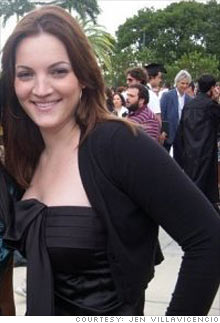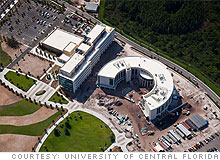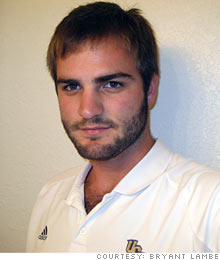Free medical school for 40 lucky students
In a bold step, the University of Central Florida's new medical school has arranged to offer its entire inaugural class full scholarships totaling $7 million.
 |
| Jennifer Villavicencio said free tuition at UCF played a big part in her decision to turn down offers to attend medical school at New York University and the University of Pittsburgh. |
 |
| UCF's College of Medicine (left) in Orlando will be complete next summer. Students in the school's inaugural class will attend classes at a specially designed facility. |
 |
| Bryant Lambe said he's not worried that UCF's new medical school is not yet fully accredited. "We're starting something new," he said. |
NEW YORK (CNNMoney.com ) -- The incoming freshmen at one of the nation's newest medical schools will have more freedom to choose whether to become a specialist or help fill the shortage of primary care doctors.
That's because the students at the University of Central Florida (UCF) in Orlando will have another freedom -- freedom from about $160,000 in debt of four years of medical school.
All 40 students of this charter class that begins Monday have received full scholarships totaling $7 million, donated entirely by members of the community -- including individuals, hospitals, banks and law firms.
"It's the first time that an entire class will go through medical school completely debt free," said Dr. John Prescott, chief academic officer with the Association of American Medical Colleges (AAMC). "I've never seen anything quite like this. It's a pretty gutsy thing to do."
UCF's initiative could be a model for reforming health care, allowing more would-be doctors to go into less lucrative but essential fields of medicine. Or it could just be a way for a new medical school to make a splash in the competition for student dollars.
Tom Boyd, senior consultant with Admissions Consultant, a firm that advises clients on college admissions, said most medical schools can't afford to give away education and training. Instead, most offer full or partial scholarships.
"They just don't have the resources to do this," Boyd said. "My view is that UCF is doing this to get its name out there. As a one-time thing, it's a great idea. But can they really do this every year?"
Contributors are sold: Attorney Michael Minton of the firm Dean, Mead, Minton & Zwemer -- whose firm established a $375,000 annual endowment to the medical school -- said the idea was "attracting the best and the brightest" to the school.
But since the new school would have no track record to speak of -- and is not yet a fully accredited medical school -- Minton said they had to find another way to attract the best students.
"So we thought, why not relieve them of their debt burden?," he said. "This levels the playing field for everyone."
In seeking the scholarships, Dr. Deborah German, the dean of the medical school, pointed to Florida's growing shortage of primary care physicians and specialists. About 13% of the state's physicians plan to reduce the scope of their practice or leave medicine in the next five years, according to Florida Department of Health's 2008 annual report.
"We're giving our students the opportunity to come get a medical education free from debt so that they can pursue their passion," German said. "We believe that when they're not in debt, they do their very best work, and they're not handcuffed to any particular specialty."
The school received more than 4,400 applications for admission, or 110 applications per available spot.
Taking a chance: Jennifer Villavicencio, 22, of Miami was accepted to medical schools at New York University and the University of Pittsburgh. But she turned them down for UCF -- but not without some doubt and concern.
"In the beginning, I was definitely concerned because this is a new medical school," Villavicencio said. "My main concern was about the residency program and whether hospitals would be interested in taking us."
Her concerns were allayed after she met with faculty members who assured her she would be "well-trained" at Orlando Regional Medical Center.
"Of course money was a very big factor for me picking UCF," she said. And after meeting with students in her class and the faculty, she was "surprised by the very high caliber" of both.
Choosing UCF was an easier decision for 21-year-old Bryant Lambe, who attended the university as an undergrad. He said his four years there were "phenomenal," and really wanted to stay another four years.
"Money is always an issue. Without the scholarship, I would have had to look out of state," he said."Now we're starting something new. All the students are so motivated."
Of the class of 40, more than half are women and 10 come from out of state.
Rethinking the curriculum: Lambe said he's excited about the curriculum, which German said focuses on using technology, such as simulation and animation, for training.
She said human patient mannequin simulators and online interactive virtual patients -- or avatars -- will complement learning from basic science concepts to clinical diagnoses and treatment.
"The advantage of starting something new is that you can do something different and break the mold," said Boyd of Admissions Consultant. "UCF has the advantage of not having a track record. So nothing's holding them back. Most medical schools are very conservative and don't favor radical change."
Grant Heston, a UCF spokesman, said the medical school was granted preliminary accreditation last year by the Liaison Committee on Medical Education (LCME).
"This is the maximum level of accreditation a new medical school can have at this point," Heston said."Final accreditation comes in the final year of the first class of students. For UCF, that is 2013."
A model?: German said the school is trying to raise funds for next year but added that "in this environment, it might be a challenge."
AAMC's Prescott said other [schools] have taken notice of German's efforts. "It's very difficult for most to replicate this concept of debt-free education," he said.
He said a more realistic hope is that the four-year all-expenses paid opportunity will encourage some of the students to go into primary care rather than higher-paid specialties, as the country faces a "real need for more primary care doctors."
But whether that wish comes true remains a big question.
"I have heard some students say they would consider taking a couple of years off after graduating to do primary care work, either in or out of the country," said Villavicencio. "I haven't decided what I want to do, but definitely a specialty." ![]()


